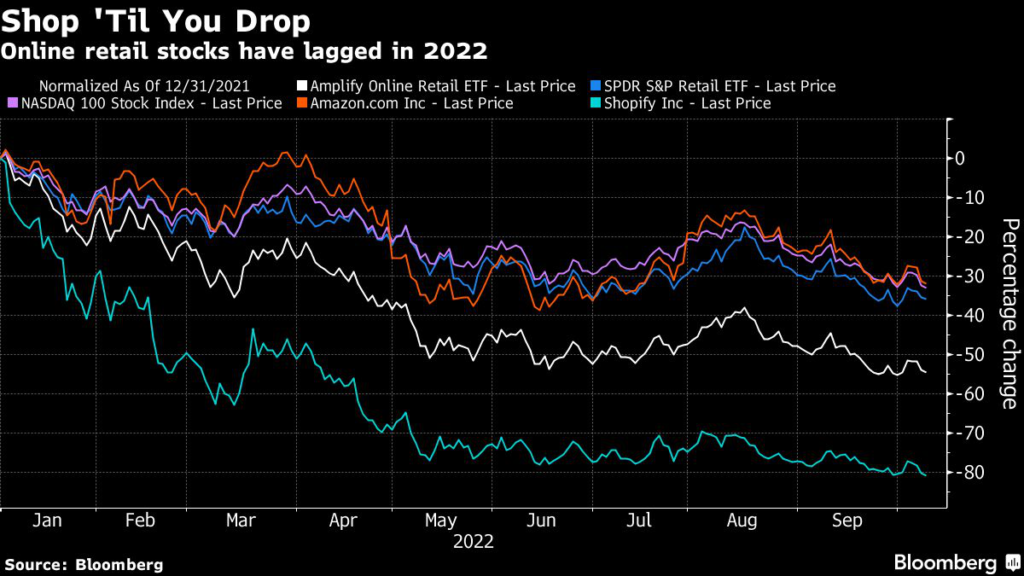E-commerce stocks have struggled this year, and plenty of investors are doubtful the holiday shopping season will provide a catalyst to turn things around.
(Bloomberg) — E-commerce stocks have struggled this year, and plenty of investors are doubtful the holiday shopping season will provide a catalyst to turn things around.
Online retailers such as Wayfair Inc. and Etsy Inc. already are under pressure from the loss of pandemic-era tailwinds and economic weakness weighing on consumer sentiment. Now, some analysts are fretting that high inventories will spur sites to offer big discounts to move merchandise, weighing on earnings at a time when investors are focused on profitability.
Adobe Analytics expects US online holiday sales to increase 2.5% this year, slower than 2021’s 8.6% pace. The shopping season gets an unofficial kickoff Tuesday with Amazon.com Inc.’s two-day “early access” sale, though Target Corp. has already started weekly Black Friday deals.
“This will be a weaker holiday season, and a deceleration in online retail growth will have a meaningful impact on valuations as investors recalibrate their expectations,” Chad Morganlander, senior portfolio manager at Washington Crossing Advisors. “We like retailers, but brick-and-mortar stocks are more reasonably priced, while there’s still a lot of air to come out of the unprofitable online space.”
The Amplify Online Retail ETF has dropped 55% this year, including a 1.2% drop on Tuesday, compared with a decline of 35% in the broader SPDR S&P Retail ETF and a 33% retreat for the Nasdaq 100 Index. Both Wayfair and Shopify Inc., which provides infrastructure for e-commerce companies, have collapsed more than 80%, and both closed at multiyear lows on Monday. Etsy has dropped 51%, eBay Inc. is down 44% and Amazon has lost a third of its value.
Even after those declines, online retailers are still expensive relative to their past valuations or to the market at a time when the Federal Reserve is aggressively raising interest rates to combat inflation, a headwind to multiples. Wayfair trades at nearly 98 times estimated earnings, and both it and Shopify are unprofitable, putting them out of favor at a time when market participants are gravitating toward companies with earnings.
Both Etsy and Amazon are below their long-term average valuations, but at 32 and 40 times earnings, respectively, they’re more than double the S&P 500 Index’s multiple of 15.3. Analysts predict Amazon’s revenue will rise 11% this year while Etsy’s growth is seen slowing to 6.2% from from 35% in 2021.
“There’s still a lot of risk and e-commerce stocks are still pretty expensive,” said Lamar Villere, partner and portfolio manager at Villere & Co. “We don’t see anything attractive, as it remains a high-multiple sector at a time when growth has slowed.”
Analysts are also pulling back their expectations: The average estimates for full-year revenue at Etsy, Wayfair and Shopify are down 9.2% or more over the past six months.
The consensus for Amazon’s is down a milder 3.6%, and the Seattle-based megacap remains a favorite for its cloud-computing and advertising businesses. Nearly 95% of analysts recommend buying the stock, while the average analyst price target implies a gain of 49% from current levels.
“The environment for online retailers isn’t as good as it was, but Amazon has the balance sheet heft that can help it endure an economic slowdown,” said Jack Ablin, chief investment officer at Cresset Capital. “If you’re a long-term investor, Amazon’s weakness could look like an opportunity.”
Tech Chart of the Day
The S&P 500 tech sector index has dropped 32% in 2022, as of its last close, a steeper decline than the 24% drop of the overall benchmark index. This year is on track to be the first one since 2013 where tech has underperformed, and the degree of underperformance is the biggest since 2002. The sector has been pressured as rising rates weigh on valuations, and as investors rotate into value strategies over growth.
Top Tech Stories
- Asia’s top chip stocks tumbled Tuesday, ensnared in an escalating US-China tech race that has erased more than $240 billion from the sector’s global market value.
- Taiwan Semiconductor Manufacturing Co. shares fell by the most in 28 years after the US imposed tighter controls over chip exports to China, escalating tensions between the two countries and pitching the global semiconductor industry into new uncertainty.
- The global PC market saw its steepest decline on record as economic uncertainty and a glut of unsold inventory dented shipments for the fourth quarter in a row.
- Just before Elon Musk revived his proposal to buy Twitter Inc. last week, the billionaire accused the company of ordering a whistle-blower to destroy evidence of its missteps as part of a $7.8 million severance package.
- Musk’s Starlink has debuted in Japan, making it the first Asian nation to receive SpaceX’s satellite internet service.
- Cathie Wood bought another tranche of Adobe Inc. shares as the stock languishes near its mid-September low when it cratered after announcing its biggest-ever acquisition.
(Updates to market open.)
More stories like this are available on bloomberg.com
©2022 Bloomberg L.P.











